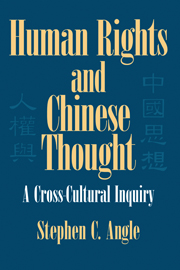Book contents
- Frontmatter
- Contents
- Preface and Acknowledgments
- Chronology
- Chapter 1 Introduction
- Chapter 2 Languages, Concepts, and Pluralism
- Chapter 3 The Consequences of Pluralism
- Chapter 4 The Shift toward Legitimate Desires in Neo-Confucianism
- Chapter 5 Nineteenth-Century Origins
- Chapter 6 Dynamism in the Early Twentieth Century
- Chapter 7 Change, Continuity, and Convergence prior to 1949
- Chapter 8 Engagement despite Distinctiveness
- Chapter 9 Conclusions
- Bibliography
- Glossary and Index
Chapter 6 - Dynamism in the Early Twentieth Century
Published online by Cambridge University Press: 14 August 2009
- Frontmatter
- Contents
- Preface and Acknowledgments
- Chronology
- Chapter 1 Introduction
- Chapter 2 Languages, Concepts, and Pluralism
- Chapter 3 The Consequences of Pluralism
- Chapter 4 The Shift toward Legitimate Desires in Neo-Confucianism
- Chapter 5 Nineteenth-Century Origins
- Chapter 6 Dynamism in the Early Twentieth Century
- Chapter 7 Change, Continuity, and Convergence prior to 1949
- Chapter 8 Engagement despite Distinctiveness
- Chapter 9 Conclusions
- Bibliography
- Glossary and Index
Summary
THE TWENTIETH CENTURY brought with it the beginnings of sustained engagement between Western and Chinese rights discourses. This chapter focuses on the works of the two Chinese intellectuals who best exemplified this trend at the turn of their century. The first is Liang Qichao (1873–1929), who was a student of Kang Youwei, a sometime employee of Zhang Zhidong, and a participant in the failed Hundred Days reform movement, after which he fled to Japan and wrote the essay we will examine here. My second subject is Liu Shipei (1884–1919). After a classical education, Liu found himself drawn to revolutionary activities in Shanghai, where he wrote the texts with which I am here concerned. For a time Liu became increasingly radical, even founding an anarchist journal in Tokyo, but after 1908 he left politics and returned to his first (and abiding) passion, namely classical scholarship.
Choosing to focus on Liang and Liu also means choosing to leave out a host of interesting texts and authors; justifying my choice of subject matter thus has two dimensions. On the positive side, I include Liang and Liu because they are the most sophisticated advocates of a “new morality” in their day. Their grasp of foreign ideas far exceeds that of most of their contemporaries; their knowledge of and engagement with their own traditions are similarly broad and deep.
- Type
- Chapter
- Information
- Human Rights in Chinese ThoughtA Cross-Cultural Inquiry, pp. 140 - 177Publisher: Cambridge University PressPrint publication year: 2002



